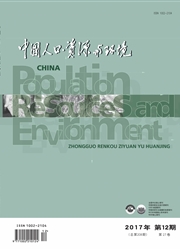

 中文摘要:
中文摘要:
农产品安全生产作为食品安全的源头和保障,事关社会稳定与经济发展的大局.为深入了解农户的生产行为,有效破解农产品安全风险防范这一关键问题,文章以改进农户的农药施用行为为切入点,基于河南、山东、江苏、浙江、黑龙江等五个典型农业生产省份100个行政村的986个样本农户的调查数据,采用倾向评分匹配法(PSM),根据具有相似培训参与倾向的未参与农户行为来估计已参与农户的反事实行为,以衡量和测度农户农药施用知识与技能培训对其农产品安全生产的影响效果.研究结果表明:在一定程度上,政府、农技人员、农业合作组织、农药经销商、亲友邻居、大众传媒等多种类型的农药施用知识与技能培训对于减少农户的农药施用量均具有正向影响;且不同类型的农药施用知识与技能培训对农户农药选择、农药施用频率以及农药施用量的影响不同,其中,由政府主办的培训与接受亲友邻居、农技人员、农药经销商和农业合作组织的技术指导对于减少农药施用量的效果最为显著.基于此,文章提出的具体对策建议是:一是政府应重视农户农药施用知识与技能培训在防控农产品安全生产中的作用,加强培训的宣传推广力度;二是提高农技人员的知识素养,完善农业合作组织;三是加大对农药经销商的管理力度,增强农药经销商的信誉度;四是结合地区经济发展差异、农户文化程度等因素考虑农药施用知识与技能培训的实施规模;五是构建和完善多层次、多元化的培训方式,促进安全生产信息的传播,以最大限度地发挥农药施用知识与技能培训对农户的正面影响作用.
 英文摘要:
英文摘要:
As a source and guarantee of food security, agricultural production is a great event that concerns the overall situation of social stability and economic development. In order to better understand farmers' behaviors in agricultural production and effectively solve the key issue of preventing agricultural products safety risks, taking farmers' behaviors of pesticide application as a starting point, based on a survey data of 986 farmer households in 100 administrative villages from 5 typical agricultural production provinces in China such as Henan, Shandong, Jiangsu, Zhejiang and Heilongjiang, this paper used the method of Propensity Score Matching ( PSM), which is based on an estimation of the counterfactual behaviors of farmers who involved in the training according to the farmers who has the similar tendency but not involved in, to evaluated the effects of knowledge and skills training of pesticide application towards farmers on agricultural production safety. Research results have shown that: to some extent, government, agricultural technologists, agricultural cooperatives, pesticide dealers, friends and neighbors, mass media and other types of pesticide applied knowledge and technical training all have positive impact on reducing farmers' pesticide application volume, and different types of the knowledge and technical training have different effects on farmers' pesticide selection, application frequency and amount. Among those measures, government-sponsored training, technical guidance from friends and neighbors, agricultural technologists, pesticide dealers and agricultural cooperatives have the most significant effect on reducing pesticide application rate. Therefore, this paper proposed some specific suggestions as follows: firstly, the government should pay more attention to the role of farmers pesticide application knowledge and technical training in the process of preventing agricultural safe production, and strengthen the promotion and marketing potency dimension of training. Secondly, t
 同期刊论文项目
同期刊论文项目
 同项目期刊论文
同项目期刊论文
 期刊信息
期刊信息
